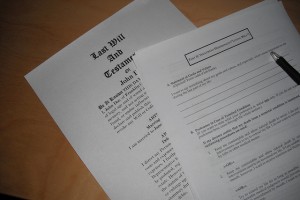 When someone dies, the disposition of their personal items, heirlooms and keepsakes are often the greatest source of contention among their surviving family members. However, during their lifetime many people fail to make arrangements to direct how those personal items should be distributed upon their death. Sometimes they make verbal assurances to certain family members during their lifetime, promising to leave them certain items upon death, but those promises are never put into writing. In order to avoid conflicts over the distribution of such items, and possibly avoid a lifetime of hard feelings between surviving relatives, it’s important to properly address these issues in your estate plan.
When someone dies, the disposition of their personal items, heirlooms and keepsakes are often the greatest source of contention among their surviving family members. However, during their lifetime many people fail to make arrangements to direct how those personal items should be distributed upon their death. Sometimes they make verbal assurances to certain family members during their lifetime, promising to leave them certain items upon death, but those promises are never put into writing. In order to avoid conflicts over the distribution of such items, and possibly avoid a lifetime of hard feelings between surviving relatives, it’s important to properly address these issues in your estate plan.
WHAT IS TANGIBLE PERSONAL PROPERTY?
The term tangible personal property refers to items of a personal nature, including things such as household goods, furniture, furnishings, jewelry, precious stones, photographs, books, silverware, china, crystal, antiques, paintings, sculptures and other works of art, collections, clothing, tools, machinery, equipment, appliances, automobiles, watercraft, recreational vehicles and equipment, pets, and other such personal effects
Tangible personal property does not include assets such as money, real estate, securities, stocks, bank accounts, investment accounts, promissory notes, IOU’s, or similar assets. Continue reading →
 Most of us, to some extent, live in a very digital world. We communicate by email or text. We socialize online, seek our entertainment online, manage our assets and finances online, store our photos, music, and other digital property. . .online. From our health care, to our home security, we are ever increasingly being pulled into the matrix.
Most of us, to some extent, live in a very digital world. We communicate by email or text. We socialize online, seek our entertainment online, manage our assets and finances online, store our photos, music, and other digital property. . .online. From our health care, to our home security, we are ever increasingly being pulled into the matrix.



 On December 20, 2019, President Trump signed into law the “Setting Every Community Up for Retirement Enhancement Act” (the SECURE Act). This new law changes how IRAs and certain other retirement benefits must be treated after death. These changes are significant, and they may affect your existing estate plan.
On December 20, 2019, President Trump signed into law the “Setting Every Community Up for Retirement Enhancement Act” (the SECURE Act). This new law changes how IRAs and certain other retirement benefits must be treated after death. These changes are significant, and they may affect your existing estate plan. An Individual Retirement Account (“IRA”) is a type of investment account that allows an individual to save money for retirement, with the earnings on the account potentially being tax deferred until they are later withdrawn at retirement. (Withdrawals from a Roth IRA can actually be tax free provided certain conditions are met).
An Individual Retirement Account (“IRA”) is a type of investment account that allows an individual to save money for retirement, with the earnings on the account potentially being tax deferred until they are later withdrawn at retirement. (Withdrawals from a Roth IRA can actually be tax free provided certain conditions are met). When someone dies, the disposition of their personal items, heirlooms and keepsakes are often the greatest source of contention among their surviving family members. However, during their lifetime many people fail to make arrangements to direct how those personal items should be distributed upon their death. Sometimes they make verbal assurances to certain family members during their lifetime, promising to leave them certain items upon death, but those promises are never put into writing. In order to avoid conflicts over the distribution of such items, and possibly avoid a lifetime of hard feelings between surviving relatives, it’s important to properly address these issues in your estate plan.
When someone dies, the disposition of their personal items, heirlooms and keepsakes are often the greatest source of contention among their surviving family members. However, during their lifetime many people fail to make arrangements to direct how those personal items should be distributed upon their death. Sometimes they make verbal assurances to certain family members during their lifetime, promising to leave them certain items upon death, but those promises are never put into writing. In order to avoid conflicts over the distribution of such items, and possibly avoid a lifetime of hard feelings between surviving relatives, it’s important to properly address these issues in your estate plan. It seems like challenges to
It seems like challenges to  There is no question about it; lawyers are not cheap. The concern over costs often drives individuals to try handling certain legal tasks on their own. This is especially true in the realm of
There is no question about it; lawyers are not cheap. The concern over costs often drives individuals to try handling certain legal tasks on their own. This is especially true in the realm of